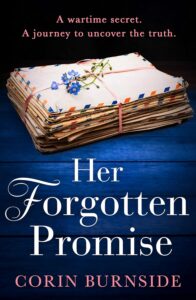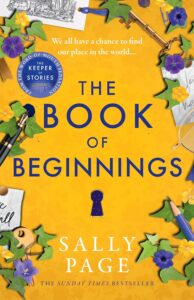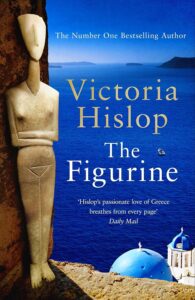The Forgotten Promise by Corin Burnside
 I’m normally a fan of dual timelines, but with this book I enjoyed the Second World War timeline so much I would have preferred for it to have filled every page. Maggie and Agnes’ story was so moving, and it was refreshing to read about a same sex romance in that period. The war around them was well researched and felt real, and I enjoyed this aspect very much.
I’m normally a fan of dual timelines, but with this book I enjoyed the Second World War timeline so much I would have preferred for it to have filled every page. Maggie and Agnes’ story was so moving, and it was refreshing to read about a same sex romance in that period. The war around them was well researched and felt real, and I enjoyed this aspect very much.
The premise of the book, without giving too much away, if that when Agnes is recruited to join SOE she is forbidden from telling Margaret, because they are only ‘friends’. In the end she does leave a letter promising to return, but it never reaches its intended recipient.
I found myself hanging on every word of Agnes’s time in France, but not so the contemporary story. I found elderly Margaret’s periods of confusion and clarity a bit too convenient to the narrative, to be honest. But it didn’t spoil the book overall.
Call me grumpy, but I just wish that the title related better to what was between the pages; the book is called The Forgotten Promise, but to me the whole point was that neither of them did forget.
The Book of Beginnings by Sally Page
 I love books about friendship, and this must be up there among the best. Although it took me a while to settle into it, once the cast of characters began to build around ‘Average Jo’ I was enthralled, and wanted to know more about them.
I love books about friendship, and this must be up there among the best. Although it took me a while to settle into it, once the cast of characters began to build around ‘Average Jo’ I was enthralled, and wanted to know more about them.
When Jo’s uncle develops dementia and her relationship breaks down, she goes to London to look after his stationery and hardware shop. Isolated and lonely, her confidence in shreds, she meets some of the people living and working around her, including Ruth, the runaway vicar, and Malcolm, a retired analyst who buys a new notebook every week. And slowly, maybe a little too slowly, their friendship begins to form.
This book is rich in vivid detail; about the settings, the characters, and the ghosts who may or ma not walk on Christmas Eve in Highgate Cemetery. Although there were small parts of the plot I did not like, they didn’t detract from the whole and I was left in awe of the writer’s skill.
The Figurine by Victoria Hislop
 As always, the sense of Greece at a certain moment in time is created perfectly by Victoria Hislop. The oppressive atmosphere of young Helena’s grandparents’ apartment when she visits in the 1970s echoes the regime her grandfather is part of, and the whiff of corruption is never far away. And when, years later, she discovers an Athens of her own, the sense of new freedoms is palpable too.
As always, the sense of Greece at a certain moment in time is created perfectly by Victoria Hislop. The oppressive atmosphere of young Helena’s grandparents’ apartment when she visits in the 1970s echoes the regime her grandfather is part of, and the whiff of corruption is never far away. And when, years later, she discovers an Athens of her own, the sense of new freedoms is palpable too.
I also really liked Helena as a character and was sufficiently interested to know how her story unfolded to almost forgive the head-hopping, which blighted the early parts of the book in particular. There was a vividly drawn supporting cast too, but I felt there were too many of them at times, too many scenes which contributed little to the overall narrative. I did enjoy the story, but overall it was too long in the telling for my taste.
On one level I feel bad criticising such a successful and established writer, but on the other, I do not want to misrepresent my personal opinion of the book.
